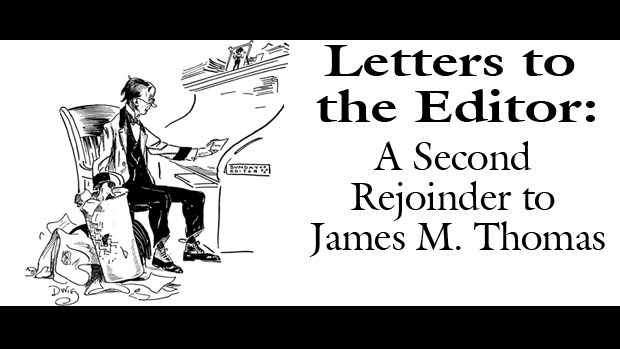
GEDSC DIGITAL CAMERA
James Thomas is so busy wrapping himself in the mantle of virtue he doesn’t bother to understand what I’m saying. He accuses me of “willful ignorance”; it’s safer than calling me a racist but not, in this context, very different.
My central point is that the heritage and symbols of the Old South, including the Confederacy, deserve some respect—that they do not deserve to be erased or trashed, and that no good will come of erasing or trashing them. Mr. Thomas not only disagrees with me; he concludes that I am in fact defending every form of racial injustice ever perpetrated by anyone.
A few clarification. Of course I know that “white supremacy and support for…slavery” were not the position of only a few extremists in the Confederacy. I said explicitly that almost all whites everywhere in the nineteenth century took white supremacy for granted. As for slavery, the Civil War was not originally seen by the North as a war against slavery. It became a war against slavery partly because the issue made useful propaganda, and partly because of the actions of the Union armies and the actions of the slaves themselves. Maybe there was a widespread change of heart in the North; maybe not. Anyway, a revolutionary situation developed, and Lincoln and others rose to the occasion.
The Robert E. Lee letter makes embarrassing reading. After calling slavery “a moral and political evil”, Lee ties himself in knots trying to harmonize it with Christianity, justice, and compassion. It can’t be done. It’s like trying to square the circle. But this moral failure on Lee’s part will not cause me to join Mr. Thomas in jeering at a great man and a great American.
Mr. Thomas describes the 1935 lynching of Elwood Higginbotham just west of Oxford. I had not known these particular details. Yes, there should be a historical marker to commemorate this shameful act. I would be glad to attend the dedication. When I say, “History has to live with what was here,” I mean it.
Now for a much more tangled question. Mr. Thomas concedes that “the military industrial complex, massive wealth and income inequality, and American imperialism” are “major issues.” It is true, as he says, that race strongly influences these issues. I should have said so. It is true “that the countries we bomb are overwhelmingly populated by black and brown bodies.” (If the bodies are white, though, as they were in Serbia, does that make it all right? Is it acceptable to threaten Russia because the Russians are white?) Economic and social injustice in the United States does weigh more heavily on black people than on white. (But far more white Americans are suffering than most liberals will admit.)
Mr. Thomas seems to think that erasing Confederate symbols will strike a powerful blow at white supremacy; that white supremacy and race hatred fully explain racism; that racism is the driving force behind all social evils; and therefore that taking down the Mississippi state flag will somehow liberate America and the world. For a sociologist, he seems oblivious to the structural aspect of racism, capitalism, and imperialism. He also ignores the ways in which racial issues are manipulated so that black and white people will fight one another instead of turning to confront their real exploiters and oppressors.
For the last time, I am not defending racism or white privilege. The movement to erase Confederate symbols is not just. It is not an effective way to attain justice. Mr. Thomas is flourishing his wooden sword not against present evils but against the past. ![]()


